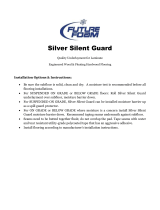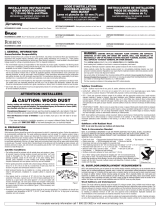
Laminate ooring should never be nailed or glued to the suboor.
The oor should not be installed against any xed, vertical objects.
CONDITIONING:
Allow laminate ooring to acclimate to room temperature (between 65ºF -75ºF) by placing
the packaged ooring at in the room for a minimum of 48 hours prior to installation. Do
not remove the plastic wrapping.
IMPORTANT
• Allow a minimum of 5/16 inch expansion space around the perimeter of the room and
any xed objects.
• Use T-moldings for rooms wider or longer than 30 feet and openings less than 6 feet.
• Stagger boards by a minimum of 8 inches.
• Do not install in rooms with relative humidity exceeding 70%.
• Flooring should be installed and maintained in a climate controlled environment with
ambient temperature between 60ºF - 80ºF and a relative humidity of 35% - 70%.
• The minimum length for the rst and last plank per row is 12 inches.
SUGGESTED TOOLS AND MATERIALS:
• Laminate installation kit (including spacers, tapping block, pull bar)
• Premium grade laminate ooring underlayment (for ooring without an attached pad).
• Hammer
• Table or hand saw
• Carbide-tipped circular saw blades
• Vacuum
• Tape measure
• Duct tape
• Premium laminate glue
• Sandpaper
• Level
• Age-resistant, non-permeable polyethylene vapor barrier (0.008 inch) - for installations
over concrete
• Safety glasses
• Gloves
• Dust Mask or Respirator
Caution: use safety glasses, gloves, and a dust mask or respirator when cutting this
product. During the cutting process, laminate may create wood dust; install in a well-
ventilated area.
GENERAL REQUIREMENTS FOR ALL SUBFLOORING:
Laminate ooring can be installed over most oors; substrates should be structurally
sound and immobile. Before installing ooring, ensure the suboor is leveled within 3/16
inch in 10 feet. Irregularities in the suboor should be smoothed using a hydraulic cement
base patching and leveling compound.
Wood:
• Suspended wood suboors should have a minimum of 18 inches of well-ventilated air
space air space above the ground.
• The moisture content of the wood suboor should not exceed 12%.
Concrete:
• New concrete subooring should be cured for at least 90 days prior to installation.
(Moisture test: moisture vapor<3 lbs/1,000 sq ft/24 hours per ASTM 1869 calcium chloride
test).
• Install 0.008 inch age-resistant, non-permeable polyethylene vapor barrier over the
concrete suboor. Tape seams with adhesive tape, such as duct tape. The vapor barrier
should be installed up the wall by 1 inch.
• For sheet vinyl, tile and wood subooring, the moisture content of the wood suboor
should not exceed 12%.
Carpeting:
• Remove deep-pile carpeting and padding prior to installation.
• Laminate ooring can be installed over industrial direct glue-down carpeting that was
installed over wood suboors without padding.
• Carpet installed over concrete must be removed. See instructions for installation over a
concrete suboor.
El piso laminado nunca debe clavarse ni pegarse al subsuelo. El piso no
debe instalarse sobre objetos verticales jos.
ACONDICIONAMIENTO:
Permita que el piso laminado se adapte a la temperatura ambiente (entre 18,3 ºC y 23,8
ºC) y la humedad relativa del 30% al 70%. Para ello, deje el piso sin desempacar en la
habitación un mínimo de 48 horas antes de la instalación. No retire la envoltura plástica.
IMPORTANTE
• Deje un espacio de expansión de 7,94 mm (5/16 pulg.) como mínimo alrededor del
perímetro de la h-blhclún y de cu-lquler objeto lun.
• Use molduras en T para habitaciones de más de 9,14 m (30 pies) y aberturas menores
a 1,82 m (6 pies).
• Las tablas deben estar escalonadas en un mínimo de 30,48 cm (12 pulg.).
• No instale el piso en habitaciones con un nivel de humedad relativa que supere el 70 %.
• Los pisos deben instalarse y mantenerse en un entorno de clima controlado, en el
que la temperatura ambiente oscile entre 15,5 ºC y 26,6 ºC (60 ºF y 80 ºF) y tenga una
humedadrelativa de entre 35 % y 10 %.
• El largo mínimo para la primera y la última plancha por illa es de 30,48 cm (12 pulg.).
HERRAMIENTAS Y MATERIALES SUGERIDOS:
• Kit para instalación de laminados (incluidos espaciadores, bloque para ajuste, varilla
de maniobra)
• Contrapiso para pisos laminados de primera calidad (para pisos sin una base adherida)
• Martillo
• Sierra de mesa o serrucho
• Hojas de sierra circular con punta de carburo
• Aspiradora
• Cinta métrica
• Cinta aislante
• Pegamento para laminado de primera calidad
• Papel de lija
• Nivel
• Barrera de vapor de polietileno impermeable resistente al paso del tiempo
(0,20 mm [0.008 pulg.]) para instalación sobre concreto
• Gafas de seguridad
• Guantes
• Mascarilla antipolvo o respirador
Precaución: Use gafas de seguridad, guantes y una mascarilla antipolvo o respirador
cuando corte este producto. Durante el proceso de corte del piso laminado, se puede
generar polvo de madera, por lo que la instalación se debe realizar en un área bien
ventilada.
REQUISITOS GENERALES PARA TODO TIPO DE SUBSUELO:
Los pisos laminados pueden instalarse sobre la mayoría de los pisos; los sustratos
deben ser estructuralmente sólidos y estar inmóviles. Antes de instalar los pisos,
compruebe que el nivel del subsuelo sea de 0,47 cm (3/16 pulg.) en 3,04 m (10 pies). Las
irregularidades del subsuelo se deben alisar con un compuesto para resanar y nivelar a
base de cemento hidráulico.
Madera:
• Los contrapisos de madera suspendida deben tener un mínimo de 18 pulg (45,72 cm)
de espacio de aire bien ventilado desde el piso.
• El contrapiso de madera no debe presentar un contenido de humedad mayor que al
12 %.
Concreto:
• EI subsuelo de concreto nuevo se debe curar por lo menos 90 días antes de la
instalación. (Prueba de humedad: vapor húmedo < 3 Ib/1000 pies cuadrados/24 horas,
según la prueba con cloruro de calcio conforme a la norma ASTM 1869).
• Instale una barrera de vapor impermeable de polietileno de 0,20 mm (0.008 pulg.)
resistente al paso del tiempo sobre el subsuelo de concreto. Debe colocar cinta adhesiva,
como cinta aislante, en las uniones. La barrera de vapor debe instalarse por la pared a
2,54 cm (1 pulg).
• Para subsuelo de Vinilo en lámina, baldosa y madera, el contenido de humedad del
subsuelo de madera no debe ser superior a un 12 %.
For Assistance, Call: 1-877-213-8532
How To Guide
Laminate Flooring (For Indoor Use Only)
Grade Levels
Above Grade
On Grade
Below Grade
1





